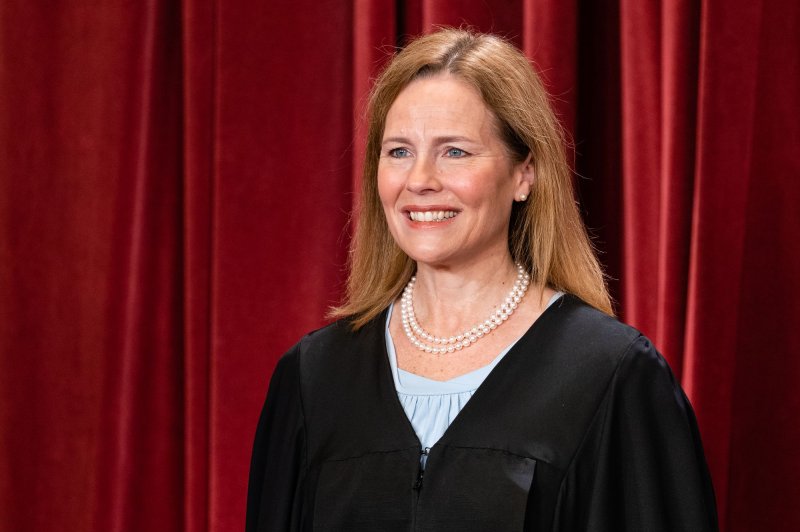Associate Justice Amy Coney Barrett is shown during the formal group photograph at the Supreme Court in Washington, D.C., on Oct. 7. File Photo by Eric Lee/UPI |
License Photo
Oct. 20 (UPI) -- Supreme Court Justice Amy Coney Barrett and a federal judge in Missouri each rejected dual challenges to President Joe Biden's student debt relief plan on Thursday.
The Brown County Taxpayers Association had filed an emergency relief request on Wednesday, arguing that Biden's plan denies Congress its role of controlling federal spending while saddling the government with a bill of more than $1 trillion.
In August, Biden announced that the White House planned to forgive $10,000 in student loan debt for those making less than $125,000 annually and $20,000 for recipients of Pell grants, which assist students from lower-income families. The loan cancellations could begin as soon as Sunday.
The Brown County Taxpayers Association's lawsuit previously failed at the district level where a federal judge dismissed it for lack of standing and an appeals court refused to overturn the lower court's ruling before the emergency relief application was sent to Barrett, who oversees the 7th Circuit.
The association sought a restraining order and preliminary injunction to block Biden's student debt relief plan from going into effect.
Barrett dismissed the application Thursday without comment, a signal that the taxpayers association lacked legal standing to challenge Biden's student debt relief plan.
In a second case, U.S. District Court Judge Henry E. Autrey in St. Louis dismissed a lawsuit brought by six Republican states -- Nebraska, Missouri, Arkansas, Iowa, Kansas and South Carolina -- that also sought declaratory and injunctive relief to block the program from taking effect.
The six states argued that Biden's Education Department breached the separation of powers, violated the Administrative Procedure Act and overstepped the 2003 Higher Education Relief Opportunities for Students Act -- also known as the Heroes Act.
The HEROES Act allows the Education Secretary to "waive or modify any statutory or regulatory provision applicable to the student financial assistance programs under title IV of the Act as the secretary deems necessary in connection with a war or other military operation or national emergency."
Autrey noted in his decision Thursday that the HEROES Act was used to provide relief amid the COVID-19 pandemic in March 2020 to pause the accrual of interest and repayment for all federally held student loans -- which was extended by Congress under the CARES Act.
When the CARES Act authorization expired, Education Secretary Miguel Cardona invoked the HEROES Act again to continue the pause on student loan repayments through December 21, 2022.
Autrey, an appointee of former President George W. Bush, said the stated had not suffered injuries that gave them the legal standing to sue the federal government.
"While plaintiffs present important and significant challenges to the debt relief plan, the current plaintiffs are unable to proceed to the resolution of these challenges," Autrey wrote in his decision.
However, Judge William Griesbach, the U.S. District Court judge in Green Bay who previously dismissed the taxpayer association's lawsuit, said in his decision that "those seeking to take advantage of the program" may want "to consider this possibility before placing undue reliance on the benefits promised."















